历任美国总统就职演说的点睛之笔
- 格式:doc
- 大小:30.50 KB
- 文档页数:2
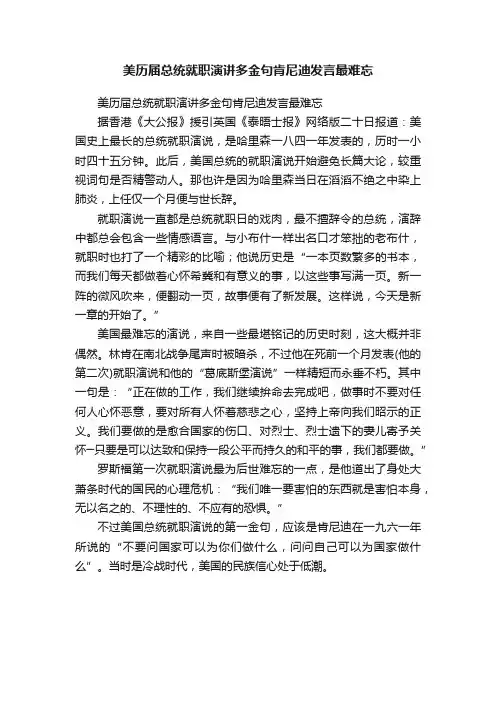
美历届总统就职演讲多金句肯尼迪发言最难忘美历届总统就职演讲多金句肯尼迪发言最难忘据香港《大公报》援引英国《泰晤士报》网络版二十日报道:美国史上最长的总统就职演说,是哈里森一八四一年发表的,历时一小时四十五分钟。
此后,美国总统的就职演说开始避免长篇大论,较重视词句是否精警动人。
那也许是因为哈里森当日在滔滔不绝之中染上肺炎,上任仅一个月便与世长辞。
就职演说一直都是总统就职日的戏肉,最不擅辞令的总统,演辞中都总会包含一些情感语言。
与小布什一样出名口才笨拙的老布什,就职时也打了一个精彩的比喻;他说历史是“一本页数繁多的书本,而我们每天都做着心怀希冀和有意义的事,以这些事写满一页。
新一阵的微风吹来,便翻动一页,故事便有了新发展。
这样说,今天是新一章的开始了。
”美国最难忘的演说,来自一些最堪铭记的历史时刻,这大概并非偶然。
林肯在南北战争尾声时被暗杀,不过他在死前一个月发表(他的第二次)就职演说和他的“葛底斯堡演说”一样精短而永垂不朽。
其中一句是:“正在做的工作,我们继续拚命去完成吧,做事时不要对任何人心怀恶意,要对所有人怀着慈悲之心,坚持上帝向我们昭示的正义。
我们要做的是愈合国家的伤口、对烈士、烈士遗下的妻儿寄予关怀─只要是可以达致和保持一段公平而持久的和平的事,我们都要做。
”罗斯福第一次就职演说最为后世难忘的一点,是他道出了身处大萧条时代的国民的心理危机:“我们唯一要害怕的东西就是害怕本身,无以名之的、不理性的、不应有的恐惧。
”不过美国总统就职演说的第一金句,应该是肯尼迪在一九六一年所说的“不要问国家可以为你们做什么,问问自己可以为国家做什么”。
当时是冷战时代,美国的民族信心处于低潮。
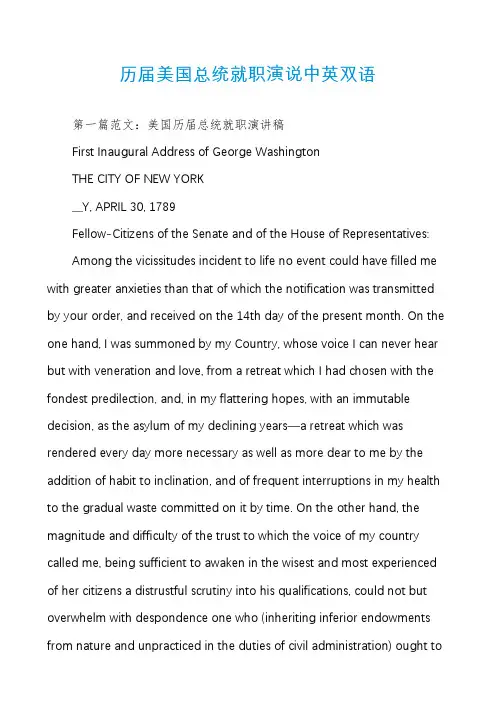
历届美国总统就职演说中英双语第一篇范文:美国历届总统就职演讲稿First Inaugural Address of George WashingtonTHE CITY OF NEW YORK__Y, APRIL 30, 1789Fellow-Citizens of the Senate and of the House of Representatives: Among the vicissitudes incident to life no event could have filled me with greater anxieties than that of which the notification was transmitted by your order, and received on the 14th day of the present month. On the one hand, I was summoned by my Country, whose voice I can never hear but with veneration and love, from a retreat which I had chosen with the fondest predilection, and, in my flattering hopes, with an immutable decision, as the asylum of my declining years―a retreat which was rendered every day more necessary as well as more dear to me by the addition of habit to inclination, and of frequent interruptions in my health to the gradual waste committed on it by time. On the other hand, the magnitude and difficulty of the trust to which the voice of my country called me, being sufficient to awaken in the wisest and most experienced of her citizens a distrustful scrutiny into his qualifications, could not but overwhelm with despondence one who (inheriting inferior endowments from nature and unpracticed in the duties of civil administration) ought tobe peculiarly conscious of his own deficiencies. In this conflict of emotions all I dare aver is that it has been my faithful study to collect my duty from a just appreciation of every circumstance by which it might be affected. All I dare hope is that if, in executing this task, I have been too much swayed by a grateful remembrance of former instances, or by an affectionate sensibility to this transcendent proof of the confidence of my fellow-citizens, and have thence too little consulted my incapacity as well as disinclination for the weighty and untried cares before me, my error will be palliated by the motives which mislead me, and its consequences be judged by my country with some share of the partiality in which they originated.Such being the impressions under which I have, in obedience to the public summons, repaired to the present station, it would be peculiarly improper to omit in this first official act my fervent supplications to that Almighty Being who rules over the universe, who presides in the councils of nations, and whose providential aids can supply every human defect, that His benediction may consecrate to the liberties and happiness of the people of the United States a Government instituted by themselves for these essential purposes, and may enable every instrument employed in its administration to execute with success the functions allotted to his charge. In tendering this homage to the Great Author of every public and private good, I assure myself that it expresses your sentiments not less than myown, nor those of my fellow- citizens at large less than either. No people can be bound to acknowledge and adore the Invisible Hand which conducts the affairs of men more than those of the United States. Every step by which they have advanced to the character of an independent nation seems to have been distinguished by some token of providential agency; and in the important revolution just accomplished in the system of their united government the tranquil deliberations and voluntary consent of so many distinct communities from which the event has resulted can not be compared with the means by which most governments have been established without some return of pious gratitude, along with an humble anticipation of the future blessings which the past seem to presage. These reflections, arising out of the present crisis, have forced themselves too strongly on my mind to be suppressed. You will join with me, I trust, in thinking that there are none under the influence of which the proceedings of a new and free government can more auspiciously commence. By the article establishing the executive department it is made the duty of the President “to recommend to your consideration such measures as he shall judge necessary and expedient." The circumstances under which I now meet you will acquit me from entering into that subject further than to refer to the great constitutional charter under which you are assembled, and which, in defining your powers, designates the objects to which your attention is to be given. It will be more consistent with thosecircumstances, and far more congenial with the feelings which actuate me, to substitute, in place of a recommendation of particular measures, the tribute that is due to the talents,the rectitude, and the patriotism which adorn the characters selected to devise and adopt them. In these honorable qualifications I behold the surest pledges that as on one side no local prejudices or attachments, no separate views nor party animosities, will misdirect the comprehensive and equal eye which ought to watch over this great assemblage of communities and interests, so, on another, that the foundation of our national policy will be laid in the pure and immutable principles of private morality, and the preeminence of free government be exemplified by all the attributes which can win the affections of its citizens and command the respect of the world. I dwell on this prospect with every satisfaction which an ardent love for my country can inspire, since there is no truth more thoroughly established than that there exists in the economy and courseof nature an indissoluble union between virtue and happiness; between duty and advantage; between the genuine maxims of an honest and magnanimous policy and the solid rewards of public prosperity and felicity; since we ought to be no less persuaded that the propitious smiles of Heaven can never be expected on a nation that disregards the eternal rules of order and right which Heaven itself has ordained; and since the preservation of the sacred fire of liberty and the destiny of the republicanmodel of government are justly considered, perhaps, as deeply, as finally, staked on the experiment entrusted to the hands of the American people.Besides the ordinary objects submitted to your care, it will remain with your judgment to decide how far an exercise of the occasional power delegated by the fifth article of the Constitution is rendered expedient at the present juncture by the nature of objections which have been urged against the system, or by the degree of inquietude which has given birth to them. Instead of undertaking particular recommendations on this subject, in which I could be guided by no lights derived from official opportunities, I shall again give way to my entire confidence in your discernment and pursuit of the public good; for I assure myself that whilst you carefully avoid every alteration which might endanger the benefits of an united and effective government, or which ought to await the future lessons of experience, a reverence for the characteristic rights of freemen and a regard for the public harmony will sufficiently influence your deliberations on the question how far the former can be impregnably fortified or the latter be safely and advantageously promoted.To the foregoing observations I have one to add, which will be most properly addressed to the House of Representatives. It concerns myself, and will therefore be as brief as possible. When I was first honored with a call into the service of my country, then on the eve of an arduous struggle for its liberties, the light in which I contemplated my duty required that Ishould renounce every pecuniary compensation. From this resolution I have in no instance departed; and being still under the impressions which produced it, I must decline as inapplicable to myself any share in the personal emoluments which may be indispensably included in a permanent provision for the executive department, and must accordingly pray that the pecuniary estimates for the station in which I am placed may during my continuance in it be limited to such actual expenditures as the public good may be thought to require.Having thus imparted to you my sentiments as they have been awakened by the occasion which brings us together, I shall take my present leave; but not without resorting once more to the benign Parentof the Human Race in humble supplication that, since He has been pleased to favor the American people with opportunities for deliberating in perfect tranquillity, and dispositions for deciding with unparalleled unanimity on a form of government for the security of their union and the advancement of their happiness, so His divine blessing may be equally conspicuous in the enlarged views, the temperate consultations, and the wise measures on which the success of this Government must depend.Second Inaugural Address of George WashingtonTHE CITY OF __LPHIAMONDAY, MARCH 4, 1793Fellow Citizens:I am again called upon by the voice of my country to execute the functions of its Chief Magistrate. When the occasion proper for it shall arrive, I shall endeavor to express the high sense I entertain of this distinguished honor, and of the confidence which has been reposed in me by the people of united America.Previous to the execution of any official act of the President the Constitution requires an oath of office. This oath I am now about to take, and in your presence: That if it shall be found during my administration of the Government I have in any instance violated willingly or knowingly the injunctions thereof, I may (besides incurring constitutional punishment) be subject to the upbraidings of all who are now witnesses of the present solemn ceremony.Inaugural Address of John Adams__AL __ IN THE CITY OF __LPHIA__Y, MARCH 4, 1797When it was first perceived, in early times, that no middle course for America remained between unlimited submission to a foreign legislature and a total independence of its claims, men of reflection were less apprehensive of danger from the formidable power of fleets and armies they must determine to resist than from those contests and dissensions which would certainly arise concerning the forms of government to be instituted over the whole and over the parts of this extensive country.Relying, however, on the purity of their intentions, the justice of their cause, and the integrity and intelligence of the people, under an overruling Providence which had so signally protected this country from the first, the representatives of this nation, then consisting of little more than half its present number, not only broke to pieces the chains which were forging and the rod of iron that was lifted up, but frankly cut asunder the ties which had bound them, and launched into an ocean of uncertainty.The zeal and ardor of the people during the Revolutionary war, supplying the place of government, commanded a degree of order sufficient at least for the temporary preservation of society. The Confederation which was early felt to be necessary was prepared from the models of the Batavian and Helvetic confederacies, the only examples which remain with any detail and precision in history, and certainly the only ones which the people at large had ever considered. But reflecting on the striking difference in so many particulars between this country and those where a courier may go from the seat of government to the frontier in a single day, it was then certainly foreseen by some who assisted in Congress at the formation of it that it could not be durable.Negligence of its regulations, inattention to its recommendations, if not disobedience to its authority, not only in individuals but in States, soon appeared with their melancholy consequences― universal languor, jealousies and rivalries of States, decline of navigation and commerce,discouragement of necessary manufactures, universal fall in the value of lands and their produce, contempt of public and private faith, loss of consideration and credit with foreign nations, and at length in discontents, animosities, combinations, partial conventions, and insurrection, threatening some great national calamity.In this dangerous crisis the people of America were not abandoned by their usual good sense, presence of mind, resolution, or integrity. Measures were pursued to concert a plan to form a more perfect union, establish justice, insure domestic tranquillity, provide for the common defense, promote the general welfare, and secure the blessings of liberty. The public disquisitions, discussions, and deliberations issued in the present happy Constitution of Government.Employed in the service of my country abroad during the whole course of these transactions, I first saw the Constitution of the United States in a foreign country. Irritated by no literary altercation, animated by no public debate, heated by no party animosity, I read it with great satisfaction, as the result of good heads prompted by good hearts, as an experiment better adapted to the genius, character, situation, and relations of this nation and countrythan any which had ever been proposed or suggested. In its general principles and great outlines it was conformable to such a system of government as I had ever most esteemed, and in some States, my ownnative State in particular, had contributed to establish. Claiming a right of suffrage, in common with my fellow-citizens, in the adoption or rejection of a constitution which was to rule me and my posterity, as well as them and theirs, I did not hesitate to express my approbation of it on all occasions, in public and in private. It was not then, nor has been since, any objection to it in my mind that the Executive and Senate were not more permanent. Nor have I ever entertained a thought of promoting any alteration in it but such as the people themselves, in the course of their experience, should see and feel to be necessary or expedient, and by their representatives in Congress and the State legislatures, according to the Constitution itself, adopt and ordain.Returning to the bosom of my country after a painful separation from it for ten years, I had the honor to be elected to a station under the new order of things, and I have repeatedly laid myself under the most serious obligations to support the Constitution. The operation of it has equaled the most sanguine expectations of its friends, and from an habitual attention to it, satisfaction in its administration, and delight in its effects upon the peace, order, prosperity, and happiness of the nation I have acquired an habitual attachment to it and veneration for it.What other form of government, indeed, can so well deserve our esteem and love?There may be little solidity in an ancient idea that congregations ofmen into cities and nations are the most pleasing objects in the sight of superior intelligences, but this is very certain, that to a benevolent human mind there can be no spectacle presented by any nation more pleasing, more noble, majestic, or august, than an assembly like that which has so often been seen in this and the other Chamber of Congress, of a Government in which the Executive authority, as well as that of all the branches of the Legislature, are exercised by citizens selected at regular periods by their neighbors to make and execute laws for the general good. Can anything essential, anything more than mere ornament and decoration, be added to this by robes and diamonds? Can authority be more amiable and respectable when it descends from accidents or institutions established in remote antiquity than when it springs fresh from the hearts and judgments of an honest and enlightened people? For it is the people only that are represented. It is their power and majesty that is reflected, and only for their good, in every legitimate government, under whatever form it may appear. The existence of such a government as ours for any length of time is a full proof of a general dissemination of knowledge and virtue throughout the whole body of the people. And what object or consideration more pleasing than this can be presented to the human mind? If national pride is ever justifiable or excusable it is when it springs, not from power or riches, grandeur or glory, but from conviction of national innocence, information, and benevolence.In the midst of these pleasing ideas we should be unfaithful to ourselves if we should ever lose sight of the danger to our liberties if anything partial or extraneous should infect the purity of our free, fair, virtuous, and independent elections. If an election is to be determined by a majority of a single vote, and that can be procured by a party through artifice or corruption, the Government may be the choice of a party for its own ends, not of the nation for the national good. If that solitary suffrage can be obtained by foreign nations by flattery or menaces, by fraud or violence, by terror, intrigue, or venality, the Government may not be the choice of the American people, but of foreign nations. It may be foreign nations who govern us, and not we, the people, who govern ourselves; and candid men will acknowledge that in such cases choice would have little advantage to boast of over lot or chance. Such is the amiable and interesting system of government (and such are some of the abuses to which it may be exposed) which the people of America have exhibited to the admiration and anxiety of the wise and virtuous of all nations for eight years under the administration of a citizen who, by a long course of great actions, regulated by prudence, justice, temperance, and fortitude, conducting a people inspired with the same virtues and animated with the same ardent patriotism and love of liberty to independence and peace, to increasing wealth and unexampled prosperity, has merited the gratitude of his fellow-citizens, commanded the highest praises of foreign nations, andsecured immortal glory with posterity.In that retirement which is his voluntary choice may he long live to enjoy the delicious recollection of his services, the gratitude of mankind, the happy fruits of them to himself and the world, which are daily increasing, and that splendid prospect of the future fortunes of this country which is opening from year to year. His name may be still a rampart, and the knowledge that he lives a bulwark, against all open or secret enemies of his country's peace. This example has been recommended to the imitation of his successors by both Houses of Congress and by the voice of the legislatures and the people throughout the nation.On this subject it might become me better to be silent or to speak with diffidence; but as something may be expected, the occasion, I hope, will be admitted as an apology if I venture to say that if a preference, upon principle, of a free republican government, formed upon long and serious reflection, after a diligent and impartial inquiry after truth; if an attachment to the Constitution of the United States, and a conscientious determination to support it until it shall be altered by the judgments and wishes of the people, expressed in the mode prescribed in it; if a respectful attention to the constitutions of the individual States and a constant caution and delicacy toward the State governments; if an equal and impartial regard to the rights, interest, honor, and happiness of all the States in the Union,without preference or regard to a northern or southern, an eastern or western, position, their various political opinions on unessential points or their personal attachments; if a love of virtuous men of all parties and denominations; if a love of science and letters and a wish to patronize every rational effort to encourage schools, colleges, universities, academies, and every institution for propagating knowledge, virtue, and religion among all classes of the people, not only for their benign influence on the happiness of life in all its stages and classes, and of society in all its forms, but as the only means of preserving our Constitution from its natural enemies, the spirit of sophistry, the spirit of party, the spirit of intrigue, the profligacy of corruption, and the pestilence of foreign influence, which is the angel of destruction to elective governments; if a love of equal laws, of justice, and humanity in the interior administration; if an inclination to improve agriculture, commerce, and manufacturers for necessity, convenience, and defense; if a spirit of equity and humanity toward the aboriginal nations of America, and a disposition to meliorate their condition by inclining them to be more friendly to us, and our citizens to be more friendly to them; if an inflexible determination to maintain peace and inviolable faith with all nations, and that system of neutrality and impartiality among the belligerent powers of Europe which has been adopted by this Government and so solemnly sanctioned by both Houses of Congress and applauded by the legislatures of the States and the publicopinion, until it shall be otherwise ordained by Congress; if a personal esteem for the French nation, formed in a residence of seven years chiefly among them, and a sincere desire to preserve the friendship which has been so much for the honor and interest of both nations; if, while the conscious honor and integrity of the people of America and the internal sentiment of their own power and energies must be preserved, an earnest endeavor to investigate every just cause and remove every colorable pretense of complaint; if an intention to pursue by amicable negotiation a reparation for the injuries that have been committed on the commerce of our fellow-citizens by whatever nation, and if success can not be obtained, to lay the facts before the Legislature, that they may consider what further measures the honor and interest of the Government and its constituents demand; if a resolution to do justice as far as may depend upon me, at all times and to all nations, and maintain peace, friendship, and benevolence with all the world; if an unshaken confidence in the honor, spirit, and resources of the American people, on which I have so often hazarded my all and never been deceived; if elevated ideas of the high destinies of this country and of my own duties toward it, founded on a knowledge of the moral principles and intellectual improvements of the people deeply engraven on my mind in early life, and not obscured but exalted by experience and age; and, with humble reverence, I feel it to be my duty to add, if a veneration for the religion of a people who profess and callthemselves Christians, and a fixed resolution to consider a decent respect for Christianity among the best recommendations for the public service, can enable me in any degree to comply with第二篇范文:美国历届总统就职演说华盛顿:First Inaugural Address of George WashingtonTHE CITY OF NEW YORK__Y, APRIL 30, 1789Fellow-Citizens of the Senate and of the House of Representatives: Among the vicissitudes incident to life no event could have filled me with greater anxieties than that of which the notification was transmitted by your order, and received on the 14th day of the present month. On the one hand, I was summoned by my Country, whose voice I can never hear but with veneration and love, from a retreat which I had chosen with the fondest predilection, and, in my flattering hopes, with an immutable decision, as the asylum of my declining years--a retreat which was rendered every day more necessary as well as more dear to me by the addition of habit to inclination, and of frequent interruptions in my health to the gradual waste committed on it by time. On the other hand, the magnitude and difficulty of the trust to which the voice of my country called me, being sufficient to awaken in the wisest and most experienced of her citizens a distrustful scrutiny into his qualifications, could not but overwhelm with despondence one who (inheriting inferior endowmentsfrom nature and unpracticed in the duties of civiladministration) ought to be peculiarly conscious of his own deficiencies. In this conflict of emotions all I dare aver is that it has been my faithful study to collect my duty from a just appreciation of every circumstance by which it might be affected. All I dare hope is that if, in executing this task, I have been too much swayed by a grateful remembrance of former instances, or by an affectionate sensibility to this transcendent proof of the confidence of my fellow-citizens, and have thence too little consulted my incapacity as well as disinclination for the weighty and untried cares before me, my error will be palliated by the motives which mislead me, and its consequences be judged by my country with some share of the partiality in which they originated.Such being the impressions under which I have, in obedience to the public summons, repaired to the present station, it would be peculiarly improper to omit in this first official act my fervent supplications to that Almighty Being who rules over the universe, who presides in the councils of nations, and whose providential aids can supply every human defect, that His benediction may consecrate to the liberties and happiness of the people of the United States a Government instituted by themselves for these essential purposes, and may enable every instrument employed in its administration to execute with success the functions allotted to his charge. In tendering this homage to the Great Author of every public and privategood, I assure myself that it expresses your sentiments not less than my own, nor those of my fellow- citizens at large less than either. No people can be bound to acknowledge and adore the Invisible Hand which conducts the affairs of men more than those of the United States. Every step by which they have advanced to the character of an independent nation seems to have been distinguished by some token of providential agency; and in the important revolution just accomplished in the system of their united government the tranquil deliberations and voluntary consent of so many distinct communities from which the event has resulted can not be compared with the means by which most governments have been established without some return of pious gratitude, along with an humble anticipation of the future blessings which the past seem to presage. These reflections, arising out of the present crisis, have forced themselves too strongly on my mind to be suppressed. You will join with me, I trust, in thinking that there are none under the influence of which the proceedings of a new and free government can more auspiciously commence.By the article establishing the executive department it is made the duty of the President "torecommend to your consideration such measures as he shall judge necessary and expedient." Thecircumstances under which I now meet you will acquit me fromentering into that subject further than to refer to the great constitutional charter under which you are assembled, and which, in defining your powers, designates the objects to which your attention is to be given. It will be more consistent with thosecircumstances, and far more congenial with the feelings which actuate me, to substitute, in place of arecommendation of particular measures, the tribute that is due to the talents, the rectitude, and the patriotism which adorn the characters selected to devise and adopt them. In these honorable qualifications I behold the surest pledges that as on one side no local prejudices or attachments, no separate views nor party animosities, will misdirect the comprehensive and equal eye which ought to watch over this great assemblage ofcommunities and interests, so, on another, that the foundation of our national policy will be laid in the pure and immutable principles of private morality, and the preeminence of free government be exemplified by all the attributes which can win the affections of its citizens and command the respect of the world. I dwell on this prospect with every satisfaction which an ardent love for my country can inspire, since there is no truth more thoroughly established than that there exists in the economy and course of nature an indissoluble unionbetween virtue and happiness; between duty and advantage; between。
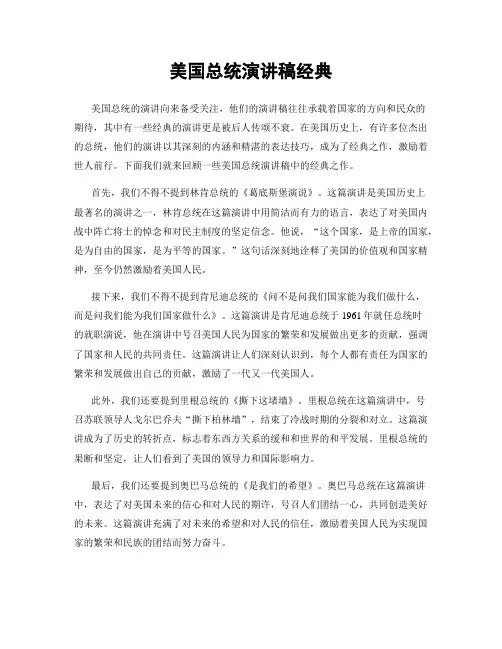
美国总统演讲稿经典美国总统的演讲向来备受关注,他们的演讲稿往往承载着国家的方向和民众的期待,其中有一些经典的演讲更是被后人传颂不衰。
在美国历史上,有许多位杰出的总统,他们的演讲以其深刻的内涵和精湛的表达技巧,成为了经典之作,激励着世人前行。
下面我们就来回顾一些美国总统演讲稿中的经典之作。
首先,我们不得不提到林肯总统的《葛底斯堡演说》。
这篇演讲是美国历史上最著名的演讲之一,林肯总统在这篇演讲中用简洁而有力的语言,表达了对美国内战中阵亡将士的悼念和对民主制度的坚定信念。
他说,“这个国家,是上帝的国家,是为自由的国家,是为平等的国家。
”这句话深刻地诠释了美国的价值观和国家精神,至今仍然激励着美国人民。
接下来,我们不得不提到肯尼迪总统的《问不是问我们国家能为我们做什么,而是问我们能为我们国家做什么》。
这篇演讲是肯尼迪总统于1961年就任总统时的就职演说,他在演讲中号召美国人民为国家的繁荣和发展做出更多的贡献,强调了国家和人民的共同责任。
这篇演讲让人们深刻认识到,每个人都有责任为国家的繁荣和发展做出自己的贡献,激励了一代又一代美国人。
此外,我们还要提到里根总统的《撕下这堵墙》。
里根总统在这篇演讲中,号召苏联领导人戈尔巴乔夫“撕下柏林墙”,结束了冷战时期的分裂和对立。
这篇演讲成为了历史的转折点,标志着东西方关系的缓和和世界的和平发展。
里根总统的果断和坚定,让人们看到了美国的领导力和国际影响力。
最后,我们还要提到奥巴马总统的《是我们的希望》。
奥巴马总统在这篇演讲中,表达了对美国未来的信心和对人民的期许,号召人们团结一心,共同创造美好的未来。
这篇演讲充满了对未来的希望和对人民的信任,激励着美国人民为实现国家的繁荣和民族的团结而努力奋斗。
总的来说,美国总统的演讲稿中充满了对国家和人民的热爱,他们用精湛的表达技巧和深刻的内涵,激励着世人前行。
这些经典的演讲,不仅是美国历史的重要组成部分,更是世界文化的宝贵遗产。
让我们铭记这些经典之作,传承这份热爱和信念,共同创造美好的未来。
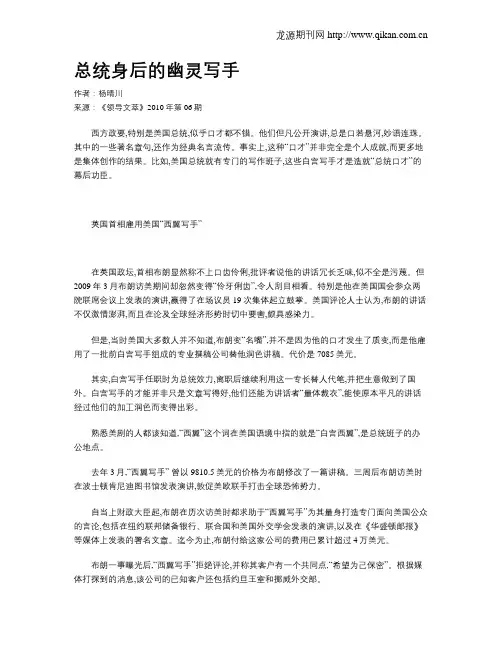
总统身后的幽灵写手作者:杨晴川来源:《领导文萃》2010年第06期西方政要,特别是美国总统,似乎口才都不错。
他们但凡公开演讲,总是口若悬河,妙语连珠。
其中的一些著名章句,还作为经典名言流传。
事实上,这种“口才”并非完全是个人成就,而更多地是集体创作的结果。
比如,美国总统就有专门的写作班子,这些白宫写手才是造就“总统口才”的幕后功臣。
英国首相雇用美国“西翼写手”在英国政坛,首相布朗显然称不上口齿伶俐,批评者说他的讲话冗长乏味,似不全是污蔑。
但2009年3月布朗访美期间却忽然变得“伶牙俐齿”,令人刮目相看。
特别是他在美国国会参众两院联席会议上发表的演讲,赢得了在场议员19次集体起立鼓掌。
美国评论人士认为,布朗的讲话不仅激情澎湃,而且在论及全球经济形势时切中要害,颇具感染力。
但是,当时美国大多数人并不知道,布朗变“名嘴”,并不是因为他的口才发生了质变,而是他雇用了一批前白宫写手组成的专业撰稿公司替他润色讲稿。
代价是7085美元。
其实,白宫写手任职时为总统效力,离职后继续利用这一专长替人代笔,并把生意做到了国外。
白宫写手的才能并非只是文章写得好,他们还能为讲话者“量体裁衣”,能使原本平凡的讲话经过他们的加工润色而变得出彩。
熟悉美剧的人都该知道,“西翼”这个词在美国语境中指的就是“白宫西翼”,是总统班子的办公地点。
去年3月,“西翼写手” 曾以9810.5美元的价格为布朗修改了一篇讲稿。
三周后布朗访美时在波士顿肯尼迪图书馆发表演讲,敦促美欧联手打击全球恐怖势力。
自当上财政大臣起,布朗在历次访美时都求助于“西翼写手”为其量身打造专门面向美国公众的言论,包括在纽约联邦储备银行、联合国和美国外交学会发表的演讲,以及在《华盛顿邮报》等媒体上发表的署名文章。
迄今为止,布朗付给这家公司的费用已累计超过4万美元。
布朗一事曝光后,“西翼写手”拒绝评论,并称其客户有一个共同点,“希望为己保密”。
根据媒体打探到的消息,该公司的已知客户还包括约旦王室和挪威外交部。
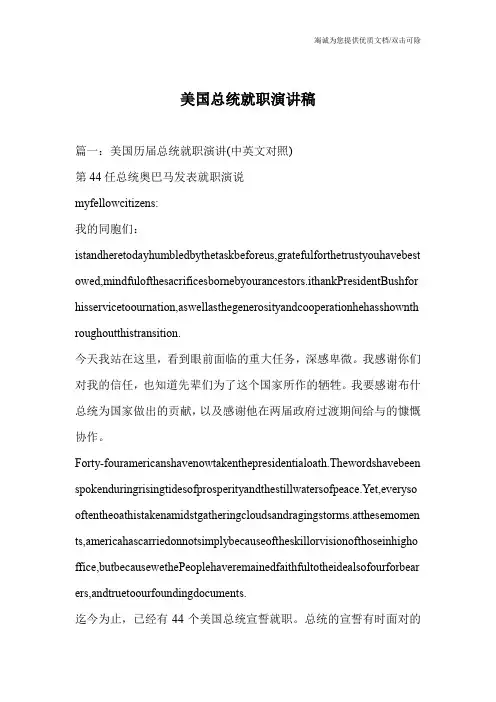
美国总统就职演讲稿篇一:美国历届总统就职演讲(中英文对照)第44任总统奥巴马发表就职演说myfellowcitizens:我的同胞们:istandheretodayhumbledbythetaskbeforeus,gratefulforthetrustyouhavebest owed,mindfulofthesacrificesbornebyourancestors.ithankPresidentBushfor hisservicetoournation,aswellasthegenerosityandcooperationhehasshownth roughoutthistransition.今天我站在这里,看到眼前面临的重大任务,深感卑微。
我感谢你们对我的信任,也知道先辈们为了这个国家所作的牺牲。
我要感谢布什总统为国家做出的贡献,以及感谢他在两届政府过渡期间给与的慷慨协作。
Forty-fouramericanshavenowtakenthepresidentialoath.Thewordshavebeen spokenduringrisingtidesofprosperityandthestillwatersofpeace.Yet,everyso oftentheoathistakenamidstgatheringcloudsandragingstorms.atthesemomen ts,americahascarriedonnotsimplybecauseoftheskillorvisionofthoseinhigho ffice,butbecausewethePeoplehaveremainedfaithfultotheidealsofourforbear ers,andtruetoourfoundingdocuments.迄今为止,已经有44个美国总统宣誓就职。
总统的宣誓有时面对的是国家的和平繁荣,但通常面临的是乌云密布的紧张形势。
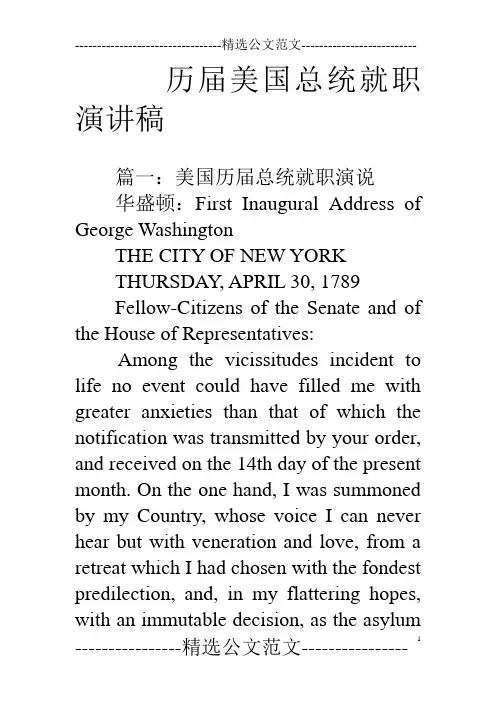
历届美国总统就职演讲稿篇一:美国历届总统就职演说华盛顿:First Inaugural Address of George WashingtonTHE CITY OF NEW YORKTHURSDAY, APRIL 30, 1789Fellow-Citizens of the Senate and of the House of Representatives:Among the vicissitudes incident to life no event could have filled me with greater anxieties than that of which the notification was transmitted by your order, and received on the 14th day of the present month. On the one hand, I was summoned by my Country, whose voice I can never hear but with veneration and love, from a retreat which I had chosen with the fondest predilection, and, in my flattering hopes, with an immutable decision, as the asylumof my declining years--a retreat which was rendered every day more necessary as well as more dear to me by the addition of habit to inclination, and of frequent interruptions in my health to the gradual waste committed on it by time. On the other hand, the magnitude and difficulty of the trust to which the voice of my country called me, being sufficient to awaken in the wisest and most experienced of her citizens a distrustful scrutiny into his qualifications, could not but overwhelm with despondence one who ought to be peculiarly conscious of his own deficiencies. In this conflict of emotions all I dare aver is that it has been my faithful study to collect my duty from a just appreciation of every circumstance by which it might be affected. All I dare hope is that if, in executing this task, I have been too much swayed by a grateful remembrance of former instances, or by anaffectionate sensibility to this transcendent proof of the confidence of my fellow-citizens, and have thence too little consulted my incapacity as well as disinclination for the weighty and untried cares before me, my error will be palliated by the motives which mislead me, and its consequences be judged by my country with some share of the partiality in which they originated.Such being the impressions under which I have, in obedience to the public summons, repaired to the present station, it would be peculiarly improper to omit in this first official act my fervent supplications to that Almighty Being who rules over the universe, who presides in the councils of nations, and whose providential aids can supply every human defect, that His benediction may consecrate to the liberties and happiness of the people of the United States aGovernment instituted by themselves for these essential purposes, and may enable every instrument employed in its administration to execute with success the functions allotted to his charge. In tendering this homage to the Great Author of every public and privategood, I assure myself that it expresses your sentiments not less than my own, nor those of my fellow- citizens at large less than either. No people can be bound to acknowledge and adore the Invisible Hand whichconducts the affairs of men more than those of the United States. Every step by which they have advanced to the character of an independent nation seems to have been distinguished by some token of providential agency; and in the important revolution just accomplished in the system of their united government the tranquil deliberations and voluntary consent of somany distinct communities from which the event has resulted can not be compared with the means by which most governments have been established without some return of pious gratitude, along with an humble anticipation of the future blessings which the past seem to presage. These reflections, arising out of the present crisis, have forced themselves too strongly on my mind to be suppressed. You will join with me, I trust, in thinking that there are none under the influence of which the proceedings of a new and free government can more auspiciously commence.By the article establishing the executive department it is made the duty of the President “torecommend to your consideration such measures as he shall judge necessary and expedient.” Thecircumstances under which I nowmeet you will acquit me from entering into that subject further than to refer to the great constitutional charter under which you are assembled, and which, in defining your powers, designates the objects to which your attention is to be given. It will be more consistent with thosecircumstances, and far more congenial with the feelings which actuate me, to substitute, in place of arecommendation of particular measures, the tribute that is due to the talents, the rectitude, and the patriotism which adorn the characters selected to devise and adopt them. In these honorable qualifications I behold the surest pledges that as on one side no local prejudices or attachments, no separate views nor party animosities, will misdirect the comprehensive and equal eye which ought to watch over this great assemblage of communities and interests, so, onanother, that the foundation of our national policy will be laid in the pure and immutable principles of private morality, and the preeminence of free government be exemplified by all the attributes which can win the affections of its citizens and command the respect of the world. I dwell on this prospect with every satisfaction which an ardent love for my country can inspire, since there is no truth more thoroughly established than that there exists in the economy and course of nature an indissoluble unionbetween virtue and happiness; between duty and advantage; between the genuine maxims of an honest and magnanimous policy and the solid rewards of public prosperity and felicity; since we ought to be no less persuaded that the propitious smiles of Heaven can never be expected on a nation that disregards the eternal rules of order and right whichHeaven itself has ordained; and since the preservation of the sacred fire of liberty and the destiny of the republican model of government are justly considered, perhaps, as deeply, as finally, staked on the experiment entrusted to the hands of the American people.Besides the ordinary objects submitted to your care, it will remain with your judgment to decide how far an exercise of the occasional power delegated by the fifth article of the Constitution is renderedexpedient at the present juncture by the nature of objections which have been urged against the system, or by the degree of inquietude which has given birth to them. Instead of undertaking particular recommendations on this subject, in which I could be guided by no lights derived from official opportunities, I shall again give way to my entire confidence in yourdiscernment and pursuit of the public good; for I assure myself that whilst you carefully avoid every alteration which might endanger the benefits of an united and effectivegovernment, or which ought to await the future lessons of experience, a reverence for the characteristic rights of freemen and a regard for the public harmony will sufficiently influence your deliberations on the question how far the former can be impregnably fortified or the latter be safely and advantageously promoted.To the foregoing observations I have one to add, which will be most properly addressed to the House of Representatives. It concerns myself, and will therefore be as brief as possible. When I was first honored with a call into the service of my country, then on the eve of an arduous struggle for its liberties, the light in which Icontemplated my duty required that I should renounce every pecuniary compensation. From this resolution I have in no instance departed; and being still under the impressions which produced it, I must decline as inapplicable to myself any share in the personal emoluments which may be indispensably included in a permanent provision for the executive department, and must accordingly pray that the pecuniary estimates for the station in which I am placed may during my continuance in it be limited to such actual expenditures as the public good may be thought to require.Having thus imparted to you my sentiments as they have been awakened by the occasion which brings us together, I shall take my present leave; but not without resorting once more to the benign Parent of the Human Race in humble supplication that, since He has beenpleased to favor the American people with opportunities for deliberating in perfect tranquillity, and dispositions for deciding with unparalleledunanimity on a form of government for the security of their union and the advancement of their happiness, so His divine blessing may be equally conspicuous in the enlarged views, the temperate consultations, and the wise measures on which the success of this Government must depend.美国人民的实验乔治-华盛顿第一次就职演讲纽约星期四,1789年4月30日参议院和众议院的同胞们:在人生沉浮中,没有一件事能比本月14日收到根据你们的命令送达的通知更使我焦虑不安,一方面,国家召唤我出任此职,对于她的召唤,我永远只能肃然敬从;而隐退是我以挚爱心憎、满腔希望和坚定的决心选择的暮年归宿,由于爱好和习惯,且时光流逝,健康渐衰,时感体力不济,愈觉隐退之必要和可贵。
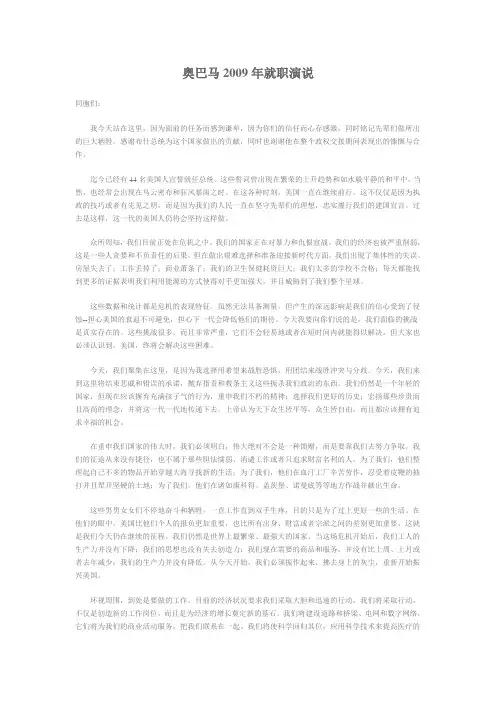
奥巴马2009年就职演说同胞们:我今天站在这里,因为面前的任务而感到谦卑,因为你们的信任而心存感激,同时铭记先辈们做所出的巨大牺牲。
感谢布什总统为这个国家做出的贡献,同时也谢谢他在整个政权交接期间表现出的慷慨与合作。
迄今已经有44名美国人宣誓就任总统。
这些誓词曾出现在繁荣的上升趋势和如水般平静的和平中,当然,也经常会出现在乌云密布和狂风暴雨之时。
在这各种时刻,美国一直在继续前行,这不仅仅是因为执政的技巧或者有先见之明,而是因为我们的人民一直在坚守先辈们的理想,忠实履行我们的建国宣言。
过去是这样,这一代的美国人仍将会坚持这样做。
众所周知,我们目前正处在危机之中。
我们的国家正在对暴力和仇恨宣战。
我们的经济也被严重削弱,这是一些人贪婪和不负责任的后果,但在做出艰难选择和准备迎接新时代方面,我们出现了集体性的失误。
房屋失去了;工作丢掉了;商业萧条了;我们的卫生保健耗资巨大;我们太多的学校不合格;每天都能找到更多的证据表明我们利用能源的方式使得对手更加强大,并且威胁到了我们整个星球。
这些数据和统计都是危机的表现特征。
虽然无法具备测量,但产生的深远影响是我们的信心受到了侵蚀--担心美国的衰退不可避免,担心下一代会降低他们的期待。
今天我要向你们说的是,我们面临的挑战是真实存在的。
这些挑战很多,而且非常严重,它们不会轻易地或者在短时间内就能得以解决。
但大家也必须认识到,美国,终将会解决这些困难。
今天,我们聚集在这里,是因为我选择用希望来战胜恐惧,用团结来战胜冲突与分歧。
今天,我们来到这里将结束悲戚和错误的承诺,抛弃指责和教条主义这些扼杀我们政治的东西。
我们仍然是一个年轻的国家,但现在应该摒弃充满孩子气的行为,重申我们不朽的精神;选择我们更好的历史;宏扬那些珍贵而且高尚的理念,并将这一代一代地传递下去。
上帝认为天下众生皆平等,众生皆自由,而且都应该拥有追求幸福的机会。
在重申我们国家的伟大时,我们必须明白,伟大绝对不会是一种馈赠,而是要靠我们去努力争取。
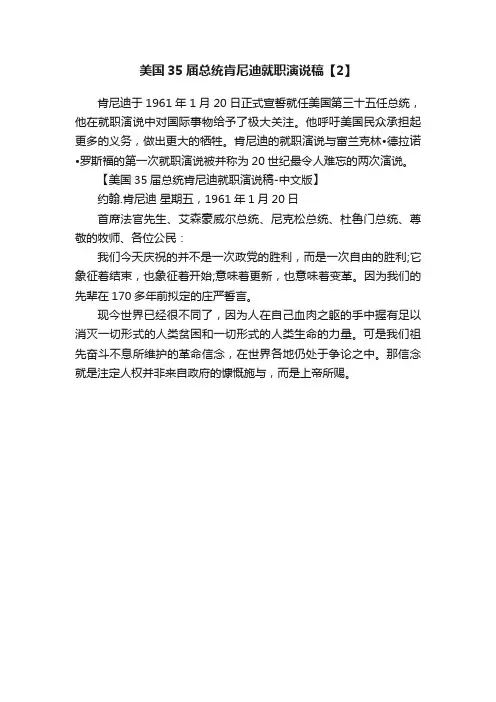
美国35届总统肯尼迪就职演说稿【2】
肯尼迪于1961年1月20日正式宣誓就任美国第三十五任总统,他在就职演说中对国际事物给予了极大关注。
他呼吁美国民众承担起更多的义务,做出更大的牺牲。
肯尼迪的就职演说与富兰克林•德拉诺•罗斯福的第一次就职演说被并称为20世纪最令人难忘的两次演说。
【美国35届总统肯尼迪就职演说稿-中文版】
约翰.肯尼迪星期五,1961年1月20日
首席法官先生、艾森豪威尔总统、尼克松总统、杜鲁门总统、尊敬的牧师、各位公民:
我们今天庆祝的并不是一次政党的胜利,而是一次自由的胜利;它象征着结束,也象征着开始;意味着更新,也意味着变革。
因为我们的先辈在170多年前拟定的庄严誓言。
现今世界已经很不同了,因为人在自己血肉之躯的手中握有足以消灭一切形式的人类贫困和一切形式的人类生命的力量。
可是我们祖先奋斗不息所维护的革命信念,在世界各地仍处于争论之中。
那信念就是注定人权并非来自政府的慷慨施与,而是上帝所赐。
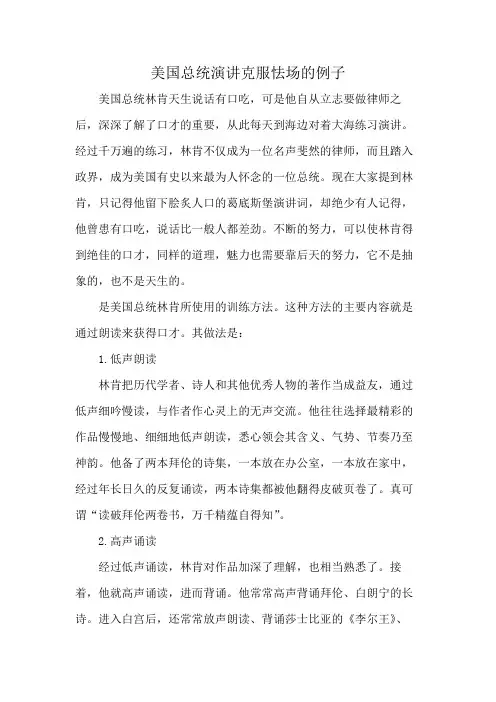
美国总统演讲克服怯场的例子美国总统林肯天生说话有口吃,可是他自从立志要做律师之后,深深了解了口才的重要,从此每天到海边对着大海练习演讲。
经过千万遍的练习,林肯不仅成为一位名声斐然的律师,而且踏入政界,成为美国有史以来最为人怀念的一位总统。
现在大家提到林肯,只记得他留下脍炙人口的葛底斯堡演讲词,却绝少有人记得,他曾患有口吃,说话比一般人都差劲。
不断的努力,可以使林肯得到绝佳的口才,同样的道理,魅力也需要靠后天的努力,它不是抽象的,也不是天生的。
是美国总统林肯所使用的训练方法。
这种方法的主要内容就是通过朗读来获得口才。
其做法是:1.低声朗读林肯把历代学者、诗人和其他优秀人物的著作当成益友,通过低声细吟慢读,与作者作心灵上的无声交流。
他往往选择最精彩的作品慢慢地、细细地低声朗读,悉心领会其含义、气势、节奏乃至神韵。
他备了两本拜伦的诗集,一本放在办公室,一本放在家中,经过年长日久的反复诵读,两本诗集都被他翻得皮破页卷了。
真可谓“读破拜伦两卷书,万千精蕴自得知”。
2.高声诵读经过低声诵读,林肯对作品加深了理解,也相当熟悉了。
接着,他就高声诵读,进而背诵。
他常常高声背诵拜伦、白朗宁的长诗。
进入白宫后,还常常放声朗读、背诵莎士比亚的《李尔王》、《哈姆雷特》等名剧的大段对话。
在看戏时,他甚至能够随口评论演员念词的正误,同时说出他本人的解释。
高声而有感情地朗读,对这些优秀作品理解得更加深透,记忆得极其牢固。
对其中的佳句,在演说或交谈时,能信手拈来,运用自如。
1860年,林肯参加美国总统竞选。
众所周知,林肯出身贫寒,而林肯的对手道格拉斯却是一位大富翁。
为了从气势上压倒林肯,道格拉斯租用了当时最豪华的竞选列车到全国各地发表演说,而且每到一站都要奏乐鸣炮,场面相当壮观。
道格拉斯得意洋洋地宣称:“我要让林肯这个乡巴佬闻闻我的贵族气味儿。
”相反,林肯没有专车,他买票乘车,每到一站,朋友们为他准备一辆耕田用的马拉车。
但林肯丝毫没有自惭形秽,他发表竞选演说时说:“有人写信问我有多少财产,我有一位妻子和三个儿子,都是无价之宝。
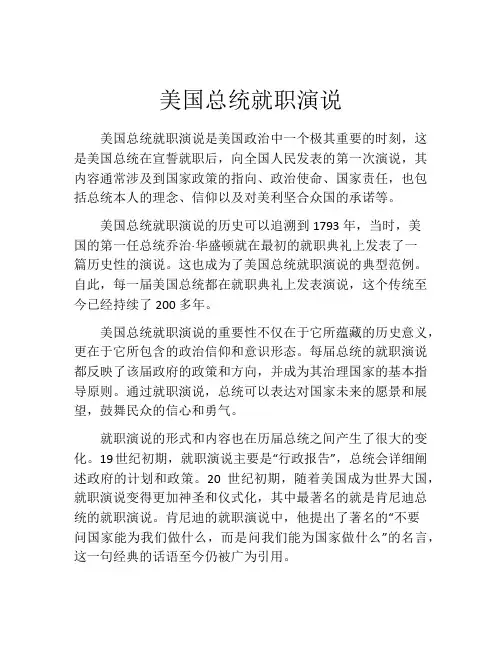
美国总统就职演说美国总统就职演说是美国政治中一个极其重要的时刻,这是美国总统在宣誓就职后,向全国人民发表的第一次演说,其内容通常涉及到国家政策的指向、政治使命、国家责任,也包括总统本人的理念、信仰以及对美利坚合众国的承诺等。
美国总统就职演说的历史可以追溯到1793年,当时,美国的第一任总统乔治·华盛顿就在最初的就职典礼上发表了一篇历史性的演说。
这也成为了美国总统就职演说的典型范例。
自此,每一届美国总统都在就职典礼上发表演说,这个传统至今已经持续了200多年。
美国总统就职演说的重要性不仅在于它所蕴藏的历史意义,更在于它所包含的政治信仰和意识形态。
每届总统的就职演说都反映了该届政府的政策和方向,并成为其治理国家的基本指导原则。
通过就职演说,总统可以表达对国家未来的愿景和展望,鼓舞民众的信心和勇气。
就职演说的形式和内容也在历届总统之间产生了很大的变化。
19世纪初期,就职演说主要是“行政报告”,总统会详细阐述政府的计划和政策。
20世纪初期,随着美国成为世界大国,就职演说变得更加神圣和仪式化,其中最著名的就是肯尼迪总统的就职演说。
肯尼迪的就职演说中,他提出了著名的“不要问国家能为我们做什么,而是问我们能为国家做什么”的名言,这一句经典的话语至今仍被广为引用。
随着技术的发展,美国总统就职演说的传播逐渐多样化。
现在,演说现场的直播不仅可以在美国各大电视台观看到,同时也可以通过网络、手机、平板电脑等多种方式进行收听和观看,甚至可以通过社交媒体等渠道进行评论和转发。
这种新媒体的形式化,并没有改变就职演说的既定规矩,但却为演说的传播带来了前所未有的广阔空间。
总体来说,美国总统就职演说具有深远的历史和意义,这是一种表达政治信仰和意识形态的方式,同时也是总统治理国家的基本指导原则。
不同届总统在就职演说中所表达的信息和理念可能不同,但他们所表达的信念和决心,都是推动国家发展进步的动力。
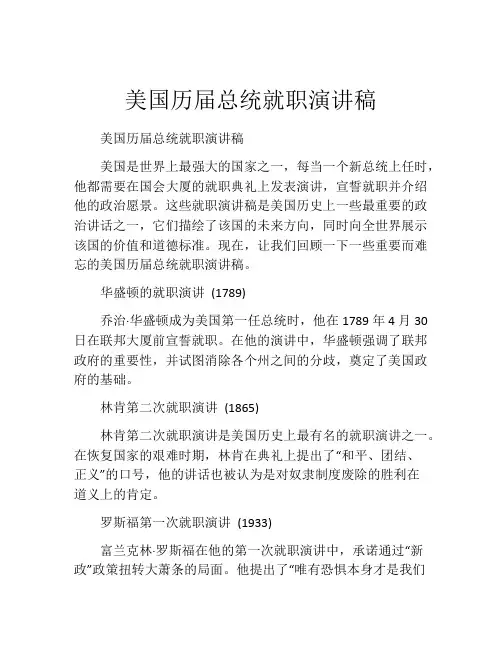
美国历届总统就职演讲稿美国历届总统就职演讲稿美国是世界上最强大的国家之一,每当一个新总统上任时,他都需要在国会大厦的就职典礼上发表演讲,宣誓就职并介绍他的政治愿景。
这些就职演讲稿是美国历史上一些最重要的政治讲话之一,它们描绘了该国的未来方向,同时向全世界展示该国的价值和道德标准。
现在,让我们回顾一下一些重要而难忘的美国历届总统就职演讲稿。
华盛顿的就职演讲(1789)乔治·华盛顿成为美国第一任总统时,他在1789年4月30日在联邦大厦前宣誓就职。
在他的演讲中,华盛顿强调了联邦政府的重要性,并试图消除各个州之间的分歧,奠定了美国政府的基础。
林肯第二次就职演讲(1865)林肯第二次就职演讲是美国历史上最有名的就职演讲之一。
在恢复国家的艰难时期,林肯在典礼上提出了“和平、团结、正义”的口号,他的讲话也被认为是对奴隶制度废除的胜利在道义上的肯定。
罗斯福第一次就职演讲(1933)富兰克林·罗斯福在他的第一次就职演讲中,承诺通过“新政”政策扭转大萧条的局面。
他提出了“唯有恐惧本身才是我们所应害怕的”这一名言,鼓舞了美国人的信心,促进了国家的复苏。
肯尼迪就职演讲(1961)约翰·肯尼迪的就职演讲被誉为美国历史上最具启发性和激情澎湃的演讲之一。
他在演讲中提出了“不要问国家为你们能做些什么,而要问你们可以为国家做些什么”的名言,这真正地激励了所有的美国人为自己的国家做出贡献。
尼克松第一次就职演讲(1969)理查德·尼克松在他的第一次就职演讲中,承诺结束越南战争,并带领美国人民消除一切分裂。
他表示,他的首要任务是在极其分裂的美国社会中建立和谐。
这一演讲推动了美国的社会改革,缩小了美国社会的分裂。
奥巴马第一次就职演讲(2009)巴拉克·奥巴马成为第一个非白人美国总统,并在他的第一次就职典礼典礼上表达了自己对2008年大选的胜利兴奋以及对美国人民的期望。
他的演讲中,奥巴马渲染了美国困境,特别是经济上的困境,并谈到了一个更加团结的美国。
美国历任总统就职演说名句(一)*我对我祖国的召唤,永远只能敬奉如仪。
I was summoned by my country ,whose voice I can never hear but with veneration and love.——乔治·华盛顿首任就职演说(1789.4.30)*同胞们:我再度奉人民之召执行总统职务.只要适当时机一到,我将会尽力表现出我心中对这份殊荣及美利坚人民对我的信任所怀有的崇高的感受。
宪法规定总统在执行公务之前,需先行宣誓就职。
现在我在你们面前宣誓:在我执掌政府期间,若企图故意触犯法律,除承受宪法惩罚外,还接受在现在这个庄严的仪式中所有见证人的严厉谴责。
Fellow Citizens:I am again called upon by the voice of my country to execute the functions of its Chief Magistrate. When the occasion proper for it shall arrive, I shall endeavor to express the high sense I entertain of this distinguished honor, and of the confidence which has been reposed in me by the people of united America.Previous to the execution of any official act of the President the Constitution requires an oath of office. This oath I am now about to take, and in your presence: That if it shall be found during my administration of the Government I have in any instance violated willingly or knowingly the injunctions thereof, I may (besides incurring constitutional punishment) be subject to the upbraidings of all who are now witnesses of the present solemn ceremony.——乔治·华盛顿连任就职演说(1789.4.30)*像我们这样的政府,不论存在多久,都是全人类知识与道德普遍传播的证明。
一、引言美国总统就职演说是具有代表性的一种政治演说,它由总统在就职时向国内外公开发表、宣布自己的施政纲领,说服公众接受并支持自己的观点。
美国总统就职演说作为一种独特而重要的文体,是一个研究热点。
这其中学者们研究关注的焦点之一就是肯尼迪的就职演说。
第35 任美国总统约翰·菲茨杰拉德·肯尼迪的就职演说与富兰克林·德拉诺·罗斯福的第一次就职演说被并称为20 世纪最令人难忘的两次美国总统就职演说,共计1355 个单词的演说成为激励型语言和呼吁公民义务的典范之作。
在他的就职演说后,约有四分之三的美国民众认可了新总统。
该演说何以具有如此的说服力?本文拟从象似角度作出解读。
二、象似性原则与肯尼迪演说语言的象似性是指语言的能指和所指之间,亦即语言的形式和内容之间有一种必然的联系,两者之间的关系是可以论证的,是有理可据的。
(沈家煊,1993;赵艳芳,2001:155-162)象似性在语言教学、英汉对比、语用分析、文体分析中应用广泛。
支配语言的象似性用法的法则称之为象似性原则。
象似性原则频频现身于各类语篇中,使语篇呈现出不同的文体特征。
从象似性的角度对就职演说加以研究能揭示其文体效果产生的深层原因,并且对于欣赏和学习演讲技巧具有一定的指导意义。
为了论述方便,笔者将从距离象似性、数量象似性、对称象似性、顺序象似性、标记象似性等几个方面对肯尼迪的就职演说加以分析。
(一)距离象似性海曼(Haiman,1983:872)提出,语言表达式之间的距离对应它们所表示概念之间的距离。
雷考夫和约翰逊(Lakoff and Johnson,1980:126-133)从隐喻的角度讨论了距离象似性问题。
他们提出,语言成分的毗邻程度体现了概念之间互相影响的程度。
请看下面的例子:And so,my fellowAmericans ask not what your country cando for you;ask what you can do for your country.My fellow citizens of the world,ask notwhatAmericawill do foryou,but what togetherwe can do for the freedom of man.一般说来,我们常用的是“do not ask what...”的句式。
肯尼迪就职演说读后感肯尼迪就职演说是美国历史上最著名的演讲之一,也是我个人最喜欢的演讲之一。
这篇演讲充满了激情和力量,深深地触动了我。
在这篇演讲中,肯尼迪总统表达了他对美国未来的愿景,以及他对美国人民的信心和期望。
通过这篇演讲,我更加深刻地理解了肯尼迪总统对于自由、民主和人权的坚定信念,以及他对于美国梦想的追求和承诺。
在演讲的开头,肯尼迪总统引用了《圣经》中的一句话,“不要问你的国家能为你做什么,而要问你能为你的国家做什么。
”这句话深刻地表达了肯尼迪总统对于公民责任和国家使命的理解。
他呼吁美国人民要团结一致,共同为国家的繁荣和发展而努力奋斗。
这种对公民责任的强调让我深受感动,也让我更加认识到作为一个公民应该怎样为国家做出贡献。
此外,肯尼迪总统在演讲中还强调了美国在国际事务中的角色和责任。
他表示美国将继续支持和捍卫世界各国的自由和独立,同时也将积极参与国际合作,共同解决全球性的问题。
这种对国际责任的承诺和担当让我深感自豪,也让我对美国作为一个国际大国的地位和作用有了更深刻的认识。
最让我印象深刻的是肯尼迪总统对于美国梦想的描述和承诺。
他表示美国是一个自由和机会的国家,每个人都有权利追求自己的梦想,不论种族、宗教或社会地位。
他呼吁美国人民要团结一致,共同努力实现美国梦想,让每个人都能够享有自由和平等的权利。
这种对美国梦想的坚定信念和承诺让我深受鼓舞,也让我更加坚定了对美国的热爱和信心。
总的来说,肯尼迪就职演说是一篇充满激情和力量的演讲,它不仅展现了肯尼迪总统的领导力和魅力,也让我更加深刻地理解了美国的价值观和梦想。
通过这篇演讲,我更加坚定了对美国的热爱和信心,也更加深刻地认识到作为一个公民应该怎样为国家做出贡献。
希望在未来的日子里,我们能够继承肯尼迪总统的理念和精神,共同努力实现美国梦想,让美国成为一个更加繁荣、和谐和美好的国家。
1961年美国总统肯尼迪就职演说篇一:肯尼迪1961年11月所发表的就职演讲肯尼迪1961年11月所发表的就职演讲肯尼迪(john Fitzgerald Kennedy,1917~1963),美国第35任总统(1961~1963),肯尼迪家族成员,任职后经历古巴危机和柏林危机,缔结美、苏、英禁止核试验条约(1963,组织拉丁美洲“争取进步同盟”,派遣和平队,在达拉斯市遇刺身亡。
本文是他1961年11月所发表的就职演讲。
In your hands, my fellow citizens, more than mine, will rest the final success or failure of our cause. Since this country was founded, each generation of Americans has been summoned to give testimony to its national loyalty. The graves of young Americans who answered the call to service surround the globe.Now the trumpet summons us again--not as a call to bear arms, though arms we need; not as a call to baffle, though in battle we are, but a call to bear the burden of a long twilight struggle, year in and year out, rejoicing in hope, patient in tribulation, a struggle against the common enemies of man: tyranny, poverty, disease and war we forge against these enemies a grand and global alliance, North and South, East andWest, that can assure a more fruitful life for all mankind? Will you join in that historic effort?In the long history of the world, only a few generations have been granted the role of defending freedom in its hour of maximum danger. I do not shrink from this responsibility--I welcome it. I do not believe that any of us would exchange places with any other people or any other generation. The energy, the faith, the devotion which we bring to this endeavor will light our country and all who serve it--and the glow from that fire can truly light the world.And so, my fellow Americans: ask not what your country can do for you--ask what you can do for your country.My fellow citizens of the world: ask not what America will do for you, but what together we can do for the freedom of man.Finally, whether you are citizens of America or citizens of the world ask of us here the same high standards of strength and sacrifice which we ask of you. With a good conscience our only sure reward, with history the final judge of our deeds, let us go forth to lead the land we love, asking His blessing and His help, but knowing that here on earth God’s work must truly be our own.summon 召唤trumpet 喇叭,号角bear 携带:配带twilight a黄昏的,黎明的tribulation 苦难,磨难fruitful 富有成效的肯尼迪1961年11月所发表的就职演讲公民们,我们事业的最终成败与其说掌握在我手中,不如说掌握在你们手中。
1961年美国总统肯尼迪就职演说篇一:肯尼迪1961年11月所发表的就职演讲肯尼迪1961年11月所发表的就职演讲肯尼迪(john Fitzgerald Kennedy,1917~1963),美国第35任总统(1961~1963),肯尼迪家族成员,任职后经历古巴危机和柏林危机,缔结美、苏、英禁止核试验条约(1963,组织拉丁美洲“争取进步同盟”,派遣和平队,在达拉斯市遇刺身亡。
本文是他1961年11月所发表的就职演讲。
In your hands, my fellow citizens, more than mine, will rest the final success or failure of our cause. Since this country was founded, each generation of Americans has been summoned to give testimony to its national loyalty. The graves of young Americans who answered the call to service surround the globe.Now the trumpet summons us again--not as a call to bear arms, though arms we need; not as a call to baffle, though in battle we are, but a call to bear the burden of a long twilight struggle, year in and year out, rejoicing in hope, patient in tribulation, a struggle against the common enemies of man: tyranny, poverty, disease and war we forge against these enemies a grand and global alliance, North and South, East andWest, that can assure a more fruitful life for all mankind? Will you join in that historic effort?In the long history of the world, only a few generations have been granted the role of defending freedom in its hour of maximum danger. I do not shrink from this responsibility--I welcome it. I do not believe that any of us would exchange places with any other people or any other generation. The energy, the faith, the devotion which we bring to this endeavor will light our country and all who serve it--and the glow from that fire can truly light the world.And so, my fellow Americans: ask not what your country can do for you--ask what you can do for your country.My fellow citizens of the world: ask not what America will do for you, but what together we can do for the freedom of man.Finally, whether you are citizens of America or citizens of the world ask of us here the same high standards of strength and sacrifice which we ask of you. With a good conscience our only sure reward, with history the final judge of our deeds, let us go forth to lead the land we love, asking His blessing and His help, but knowing that here on earth God’s work must truly be our own.summon 召唤trumpet 喇叭,号角bear 携带:配带twilight a黄昏的,黎明的tribulation 苦难,磨难fruitful 富有成效的肯尼迪1961年11月所发表的就职演讲公民们,我们事业的最终成败与其说掌握在我手中,不如说掌握在你们手中。
历任美国总统就职演说的点睛之笔
中国一句成语叫画龙点睛,往往最后一笔最传神。
美国新任总统的就职演说也是一样,最值得关注的就是最后一部分,如何让听众情绪high到最高点。
当然,我指的是演讲的最后一部分,而不一定是最后一句话,因为美国总统演讲的最后一句话一般都上帝有关,最典型的一句是God bless you and may God bless America(愿上帝保佑你们,保佑美利坚),有点像过去中国人说的“万岁万岁万万岁”,只是一个程式。
正如毛泽东所说,真正的上帝其实就是人民大众,美国的总统对这一点也非常清楚,所以演讲的最后总是落脚到美国民众。
直到今天,人们还津津乐道1961年1月20日肯尼迪就职演讲结尾时的点睛之笔:“我的美国同胞们:不要问你的国家可以为你做什么,而要问你可以为你的国家做什么(my fellow Americans: ask not what your country can do for you—ask what you can do for your country)”。
肯尼迪的那番话对他的美国同胞提出了高标准严要求,而肯尼迪的继承人约翰逊在1965年1月20日的就职演说的结尾则引用了圣经的一句话恭维他的美国同胞:“请赐我智慧与知识,让我得以面对我们的人民。
不然,如何能估量出我们人民的伟大呢?”(Give me now wisdom and knowledge, that I may go out and come in before this people: for who can judge this thy people, that is so great?)
约翰逊之后的总统就是打开中美关系大门的尼克松总统,他两度当选总统,所以有两次就职演说。
他在1973年1月20日第二次就职演说的结尾提起了他的前任:“当我站在这里,一个被历史赋予了神圣性的地方,我想到了在我之前曾经站在这里的那些人,想到了他们的美国梦,我知道他们中的每个人都意识到:为了使梦想成真,他们个人的努力远远不够,需要民众的助力(As I stand in this place, so hallowed by history, I think of others who have stood here before me. I think of the dreams they had for America, and I think of how each recognized that he needed help far beyond himself in order to make those
dreams come true)”。
1977年1月20日卡特总统在就职演说中的结尾已经提到了他离任的那一天:“我和你们一样希望,当我作为你们的总统任期结束的时候,人们将会这样谈论我们的国家:…..”(And I join in the hope that when my time as your President has ended, people might say this about our Nation:…….),他的希望包括了很多内容,但都很朴实,这里只举几个例子:每个有劳动能力的人都找到了有价值的工作;不论强弱、贫富在法律面前都人人平等;每个美国家庭都和谐
兴旺。
卡特只担任了一任总统,接任的里根则担任了两届总统职位,他在1981年1月20日第一次就职演讲的结尾讲了第一次世界大战中一个普通士兵的故事。
这个士兵的名字叫Martin Treptow,他本来在美国一个小城的理发店工作,大战开始后他应征入伍来到了法国战场。
当这位士兵在战场上牺牲后,人们在他的身上发现了一个日记本,里面有这样的“决心书”(my pledge):“美国必胜。
为此,我要工作,我要节俭,我要奉献,我要忍耐,我要热忱地竭尽最大努力去战斗,就好象整个战争的胜负取决于我一个人(America must win this war.
Therefore, I will work, I will save, I will sacrifice, I will endure, I will fight cheerfully and do my utmost, as if the issue of the whole struggle depended on
me alone)”。
1989年1月20日就职的老布什在就职演讲的最后也谈到了历史,但是不是像里根那样讲了一个动人故事,而是诗情画意的描述:“我把历史看作是一本有许多页码的书籍,每一页都记录了心想事成的每一天。
微风吹过,翻开了新的一页,新的故事开始了(But I see history as a book with many pages, and each day we fill a page with acts of hopefulness and meaning. The new breeze
blows, a page turns, the story unfolds)”。
克林顿在1997年1月20日他的第2次就职演说的最后也使用了诗的语言,但不是像布什一样描述历史,而是展望未来:“我们还看不到我们的后代的面孔,也永远不会知道他们的名字,但是当他们谈论到我们的时候,希望他们会说我们把祖国领进了新的世纪,把有活力的美国梦留给了所有的子孙(May those generations whose faces we cannot yet see, whose names we may never know, say of us here that we led our beloved land into a new century with the American Dream alive for all her children)”。
2001年1月20日,小布什在他的第1次就职演讲中的最后使用了排比句式鼓舞民心:“永不疲惫、永不气馁、永不完竭,今天我们重树这样的目标:使我们的国家变得更加公正、更加慷慨,去体现我们每个人和所有人生命的尊严(Never tiring, never yielding, never finishing, we renew that purpose today, to make our country more just and generous, to affirm the dignity of our lives and
every life.)。
小布什虽然说得好听,但是他重树的目标显然并没有达到。
8年后,当美国历史上第一位非洲裔总统就任的时候,奥巴马是以这样颇为沉重的语句结束他的就职演说的:“满怀希望和信念,让我们再度穿越冰凌,顶住来袭的风暴。
愿我们的孩子的孩子们这样评说:当先辈们当年面临严峻考验的时候,他们没有停下脚步,没有回头,也没有动摇…(With hope and virtue, let us brave once more the icy currents, and endure what storms may come. Let it be said by our children's children that when we were tested we refused to let this journey end, that we did not turn back nor did we falter…)”。